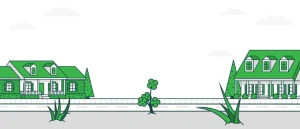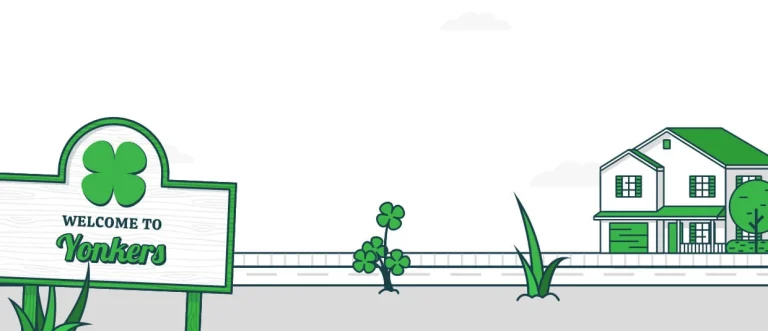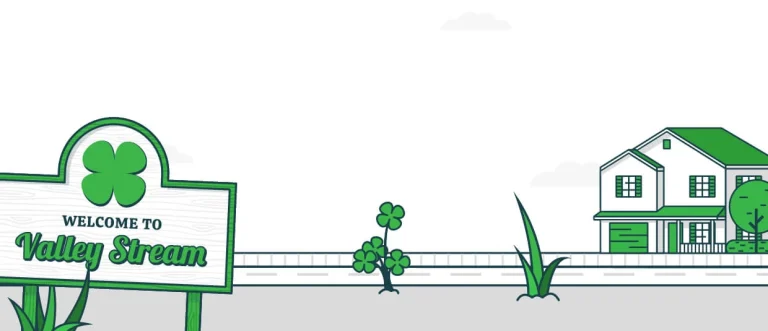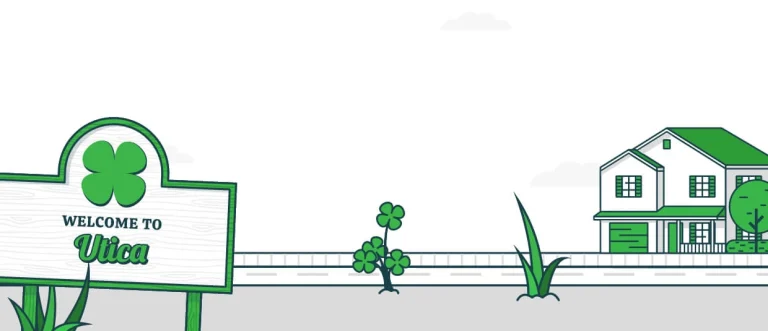At Clovered, we aim to make your quoting experience as easy as possible. We want to help residents find the best homeowners insurance in Alabama, so we made this guide to help you understand the details of coverage before you start looking.
Key Takeaways:
- The average cost of homeowners insurance in Alabama’s largest cities ranges from $1,658 to $2,669 annually.
- Cities near the Gulf Coast have higher premiums, but you can save money with wind mitigation.
- You increase your chances of securing cheap coverage by shopping around.
How Much Is Homeowners Insurance in Alabama?
The average cost of homeowners insurance in Alabama is about $1,658 for $150,000 of coverage and $2,669 for $300,000 of coverage, although rates vary due to location, property values, and other factors. We organized rates from 15 significant cities in the state to give a realistic picture of what you might expect when you get quotes.
The rates in this article are sourced from the Alabama Department of Insurance, which provides real premiums from several companies in the state. For representative rates, we analyzed premiums for policies with $150,000 and $300,000 worth of dwelling coverage for a 10-year-old brick house with basic security features, namely deadbolt locks and smoke detectors.
The sample policyholder is a 40-year-old nonsmoker with a 710 credit score, no previous claims, and a $500 deductible. So, look at the table below for the average homeowners insurance in Alabama.
| City | $150,000 Coverage | $300,000 Coverage |
|---|---|---|
| $1,350 | $2,115 | |
| $1,497 | $2,340 | |
| $1,329 | $2,064 | |
| $1,187 | $1,896 | |
| $1,563 | $2,497 | |
| $2,183 | $3,525 | |
| $1,492 | $2,356 | |
| $1,484 | $2,367 | |
| $1,595 | $2,577 | |
| $2,227 | $3,600 | |
| $2,752 | $4,427 | |
| $1,469 | $2,376 | |
| $1,783 | $2,922 | |
| $1,341 | $2,201 | |
| $1,614 | $2,782 | |
|
Average |
$1,658 |
$2,669 |
As you can see, rates vary notably by location and coverage amount. The dwelling coverage amount in your policy is important because it’s based on your home’s value. Larger, more expensive houses that cost more to build need more coverage and cost more to insure, as reflected in the premiums.
Location is also critical because natural disaster susceptibility, crime rates, and other variables affect your home’s risk profile and chances of experiencing a claim.

It’s Time to Switch Your Homeowners Insurance
We partner with the nation’s top homeowners insurance companies so you can get a custom policy at an affordable price.
How Much Is Homeowners Insurance in Alabama With Wind Mitigation?
Another large influence on Alabama home insurance rates is wind mitigation. Wind mitigation involves voluntary building fortification measures, such as impact-resistant shingles, sealed roof decks, and ring-shank nails, that improve a house’s resiliency after a hurricane or tornado. Wind mitigation is most prevalent on houses near Alabama’s coastline, as these homes are more prone to direct hits from hurricanes and tropical storms.
Wind mitigation lowers premiums. The table below shows which locations have the cheapest homeowners insurance in Alabama with wind mitigation and how premiums differ for homes with and without wind mitigation.
| City | No Wind Mit | With Wind Mit | Average |
|---|---|---|---|
|
Daphne |
$2,977 | $1,388 | $2,183 |
|
Foley |
$2,994 | $1,458 | $2,227 |
|
Gulf Shores |
$3,847 | $1,658 | $2,752 |
|
Mobile |
$3,590 | $2,247 | $2,922 |
Wind mitigation reduced premiums in Daphne, Foley, and Gulf Shores by over 50% and lowered rates in Mobile by 37%, on average. Many newer coastal homes have at least some wind mitigation built in, but older houses may not be built with such elements.
These significant savings make getting a wind mitigation inspection on your house worthwhile. The inspection report will tell you what needs to be done to your home to retrofit it with the right features effectively, and you can weigh the cost of wind mitigation with the potential insurance savings.
The following table shows the same wind mitigation considerations as above but on policies with $300,000 worth of dwelling coverage, which may be more representative of the often more expensive houses near the coast.
| City | No Wind Mit | With Wind Mit | Average |
|---|---|---|---|
|
Daphne |
$4,658 | $2,387 | $3,525 |
|
Foley |
$4,658 | $2,543 | $3,600 |
|
Gulf Shores |
$5,981 | $2,873 | $4,427 |
|
Mobile |
$3,590 | $2,247 | $2,922 |
What Factors Affect Homeowners Insurance Rates in Alabama?
The average homeowners insurance in Alabama ranges from $1,658 to $2,669 in the state’s largest cities and can be higher near the beach. Several factors, in addition to location, affect home insurance rates, though.
Insurance companies need to minimize their risk when writing policies. To appropriately do so, they must analyze as many factors as possible about a potential policyholder and their property to flesh out a full risk profile. In Alabama, some of the chief concerns that insurance companies take into consideration are:
- Location
- Age and size of your home
- Construction style and roof of your home
- Policy coverage limits and deductible
- Policyholder claims history
Location: Your location determines your susceptibility to severe weather. In 2024 alone, Alabama suffered seven severe storms, costing up to a billion dollars in damage. Some places are more likely to suffer damage from these storms than others.
For instance, homes on or near the Gulf of Mexico in Alabama are much more at risk of hurricane damage than houses in far-inland cities, as we touched on earlier. This is one of the primary reasons coastal cities tend to have higher premiums for house insurance in Alabama and significantly factor in wind mitigation.
Other location-based considerations are also important. Being in a high-risk flood zone could raise your premiums since you’re more likely to suffer flood damage. Rural properties far from fire stations could also face higher premiums since emergency services’ delayed response times make your home riskier.
Home age and size: Newer homes often have lower Alabama homeowners insurance rates than older homes. They are constructed to the latest building and safety codes, which insurance companies like. New houses are also more likely to survive severe weather. Older homes are much more likely to have issues that lead to claims, like leaky pipes and old roofs. Older homes are also more likely to have elements that scare off insurers altogether and prevent the homeowner from getting coverage, such as aluminum wiring and polybutylene pipes.
Larger, more expensive homes typically need more coverage, so they tend to cost more to insure. The tables in this article above show that $300,000 worth of dwelling coverage always costs more than $150,00 worth of dwelling coverage.
Home construction aspects: Masonry homes—typically made from brick or concrete—are usually sturdier than wooden frame houses. They can better resist strong winds from hurricanes and tropical storms, so they often have slightly lower rates than similarly sized frame homes. Also, a brick house is less likely to suffer fire damage.
Policy deductible: Your home insurance deductible is the amount you pay when filing a claim before your insurer steps in to cover the rest of the damage. Common deductibles for home insurance in Alabama range between $500 and $2,000. Policies with higher deductibles have lower premiums and vice versa.
Claims History: If you’ve filed multiple claims with your insurer, you may pay higher rates than someone who has never filed. Providers believe someone who has previously filed several claims is more likely to file another.
When getting home insurance quotes in Alabama, insurance companies usually ask if you’ve filed any claims in the past 3 to 5 years. If you have, you may be considered higher risk and pay higher premiums.

It’s Time to Switch Your Homeowners Insurance
We partner with the nation’s top homeowners insurance companies so you can get a custom policy at an affordable price.
What Does Homeowners Insurance Cover in Alabama?
The most common type of homeowners insurance is an HO-3 policy. HO-3 policies are divided into different parts based on what area of your home or livelihood they cover. The parts of a typical plan for property insurance in Alabama are:
Dwelling coverage: Protects the main structure of your home and its many components. Your roof, walls, floor, patio, home wiring, air conditioning, and more fall under dwelling coverage.
Other structures coverage: Protects the features on your property that aren’t attached to your main house, such as fences, sheds, gazebos, pools, and more.
Personal property coverage: Covers your belongings in and around your property, such as clothes, electronics, tools, art, furniture, jewelry, and more.
Loss of use coverage: Applies if you’re forced to move out of your house after damage from a covered peril. Loss of use coverage can cover your accommodations, food, gas, and more while temporarily displaced.
Liability coverage: Covers your financial liability if someone gets injured on your property and pursues you for the damages. Your liability coverage can cover the injured party’s medical bills and your legal fees.
Medical payments coverage: Similar to liability coverage, medical payments covers injuries someone can suffer. It’s designated for minor injuries only.
What to Know About Flood Insurance in Alabama
Homeowners insurance coverage doesn’t include flooding, which is important to realize because floods are the nation’s most common and costly natural disaster. You need a separate policy for Alabama flood insurance.
The National Flood Insurance Program (NFIP) is the most common option to turn to for flood coverage. The NFIP offers federally subsidized flood insurance in over 400 communities around Alabama.
There are also a small but growing number of private flood insurance companies entering the market. Private firms can offer more flexibility and greater coverage limits than federal NFIP plans, but their rates may be less competitive. Our Clovered team can help you with both your home and flood insurance needs.

Stay Above Water With Flood Insurance
Do you want to pay for costly and common flood damage yourself or have an insurance policy pick up the tab?
How to Get the Best Homeowners Insurance in Alabama
Getting the best home insurance in Alabama requires an understanding of your coverage needs and budget. You should understand how your policy and its coverages work so you can adjust them to your needs. For instance, when quoting, you can change your coverage limits and add endorsements.
Every coverage area we discussed above has a maximum possible payout called a limit. When quoting, you can choose many of your policy’s limits. Opting for higher limits will increase financial protection after covered damage, but it will also raise your premiums. Strike a balance between affordability and cost.
You can conduct a home inventory listing all your possessions and their values to determine the amount of personal property coverage you need to the dollar. You can also easily adjust your liability limits based on the personal assets you want to protect. Most companies offer liability limits ranging from $100,000 to $1 million.
Homeowners insurance covers several perils, including theft and wind, water, and fire damage. However, some items or perils aren’t included in your policy’s default language. If you know you have some property risks that are uncovered, you can add them to your plan through endorsements. Some common endorsements include:
- Scheduled personal property coverage for particularly expensive valuables (such as jewelry, artwork. memorabilia)
- Water backup coverage for sewage and other backups through pipes and drains
- Permitted incidental occupancies endorsement for home-based businesses
- Sinkhole coverage for damage caused by sinkholes
- Equipment breakdown coverage for damage caused by sudden failure of an appliance
Endorsement costs and offerings will vary slightly by company. If you’re interested, be sure to ask an agent or company representative about them.
Also, some policies may exclude wind coverage by default, especially near the coast. It’s always best to have hurricane insurance in Alabama, etiher by default or through an endorsement, although it may affect your rates.
Note that if you have a mobile or manufactured house in Alabama, you’ll need a different type of coverage. Manufactured home insurance in Alabama is fulfilled through an HO-7 policy, which has different rates and coverages than a standard HO-3 home insurance plan.
Much like homeowners insurance, the best mobile home insurance in Alabama depends on the age of the dwelling, location, and other factors.
Largest Homeowners Insurance Companies in Alabama
The largest Alabama homeowners insurance companies by market share are:
- State Farm (26.8%)
- Alfa Insurance (14.2%)
- Allstate (11.4%)
- USAA (9%)
- Liberty Mutual (4.9%)
State Farm is the largest home insurer in Alabama by a notable margin. However, bigger doesn’t always mean better. Four of the top five home insurance companies in Alabama are nationwide carriers, while Alfa Insurance is a regional provider that only offers coverage in Mississippi, Georgia, and Alabama.
In addition to these carriers, you may want to get quotes from several other providers, big and small, to compare customer service, quoting experience, rates, and more to make the right choice on an Alabama insurance company.
How to Get the Cheapest Homeowners Insurance in Alabama
If you’re a current Alabama resident, you’ve probably noticed home insurance premiums rising in the past few years. Rates nationwide have been increasing due to inflation, rising construction costs, and severe weather like hurricanes.
While getting the cheapest home insurance in Alabama may not be as easy as it used to be, finding a deal is still possible. You should always shop around. Watch for discounts you can qualify for, and consider raising your deductible.
Shop around: Comparing multiple quotes is the best and really only way to know you’re getting the best deal. This will allow you to see which company has the most affordable rates. Also, you can shop around once again when your policy renews if you experience a rate hike you’re unhappy with.
Understand discounts: Always recognize available discounts. Some carriers may have better or more discounts that you qualify for than others. For example, one carrier could have better rewards for staying loyal or claims-free or bigger discounts for bundling multiple policies with home and auto insurance in Alabama.
Raise your deductible: Your deductible is the amount of money you must pay in a claim before your insurer picks up the rest of the bill. When getting a policy, you choose your deductible, which typically ranges from $500 to $2,000.
Picking a higher deductible can get you cheap homeowners insurance in Alabama. Insurance companies reward policyholders who opt for higher deductibles because that person vows to pay more out of their own pocket before invoking the insurer’s help. Just be careful not to set your deductible to too high of a number that you can’t afford because then you’ll never be able to file a claim.

It’s Time to Switch Your Homeowners Insurance
We partner with the nation’s top homeowners insurance companies so you can get a custom policy at an affordable price.
What to Know About Insurance Agents in Alabama
These days, most home insurance companies in Alabama have ways you can quote online directly with the carrier. However, another helpful way to find coverage may be with an insurance agent. Insurance agents in Alabama can help you understand your coverage needs and recommend the right policies and coverages so you don’t have to go through the quoting process on your own.
There are two primary types of insurance agents: captive and independent. Captive agents are essentially middlemen for just one insurance provider. State Farm, for example, sells all its insurance through captive agents that only represent State Farm.
On the other hand, independent agents work with multiple insurance companies and can find you a policy that meets your needs from any of their partners.
Is Wind and Hail Insurance Required in Alabama?
Homeowners insurance, also sometimes known as wind and hail insurance in Alabama, isn’t required by law. However, any homeowners with mortgages will need to have a home insurance policy at all times since lenders require coverage as a condition of their home loans.
Lenders mandate home coverage to protect their investments. If you don’t get a policy on your own, your mortgage lender will secure a plan for you. The force-placed insurance they provide should be avoided at all costs, since force-placed insurance is usually more expensive and less comprehensive than a policy you can secure on your own.
Alabama Homeowners Insurance Laws to Know
An insurance policy is a legal contract between you and your provider. As such, there are some Alabama homeowners insurance laws to be aware of regarding your carrier’s responsibilities and your duties as a policyholder.
For instance, an insurance company must acknowledge your claim within 15 days of you filing it. They should let you know if your claim is accepted or denied within 30 days, and if they need more time, they must notify you within that 30-day window.
As a policyholder, you must file a claim promptly after suffering damage. You can’t misrepresent damage or submit false information when quoting, as that’s insurance fraud.
How to Get Homeowners Insurance Quotes in Alabama
At Clovered, we’ve built a free online tool that allows you to get quotes from several of the best home insurance companies in Alabama all in one place to make shopping for the right policy easier. Clovered was conceived with the consumer in mind. Our goal is to simplify home insurance.
We want to help you find the coverage you need at the price you want. If you’d like to speak with one of our licensed agents for homeowners insurance quotes in Alabama, please call 833-255-4117 Monday through Friday during business hours. Or, you can email us anytime at agent@clovered.com.
The editorial content on Clovered’s website is meant to be informational material and should not be considered legal advice.

 Average Cost of Homeowners Insurance in Alabama by City
Average Cost of Homeowners Insurance in Alabama by City 

